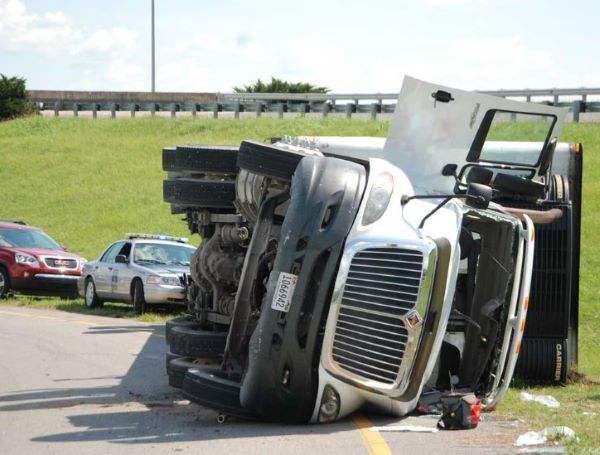The North Carolina Trucking Association reveals that nearly 86% of North Carolina communities depend on trucking services to move goods and other services. That is equivalent to over 7 billion miles of road that trucks cover annually. Unfortunately, more time spent on the road could potentially harm truckers and other motorists. The nature of the vehicle itself is a danger on the road because of its size and weight. Therefore, serious injuries and fatalities involving 18-wheeler accidents are more likely.
Understanding the North Carolina trucking accident law is the first step in preserving your legal rights when you’re involved in an accident with a truck. This knowledge could pay off when claiming damages or seeking insurance payments.
Basic Overview of North Carolina Trucking Laws
While truck accidents are common, it does not mean they have to happen. The North Carolina trucking laws are created to ensure the safety of trucks on the road and to prevent accidents from happening.
In North Carolina, trucking companies must abide by federal and state regulations on operating a truck vehicle. Failure to obey these regulations is a form of negligence and can be charged and fined appropriately.
1. Hours of Service
North Carolina trucking law specifies that a truck driver cannot exceed 12 hours of operating a truck, especially following an eight-hour duty. Moreover, the driver must not register more than 70 hours of duty within a 7-day period (or 80 hours for an 8-day period). The eight-day clause depends on the hours logged in the past seven days.
2. Truck Accident Reporting
The next important aspect of the North Carolina Trucking Accident Law is reporting accidents to authorities. It is similar to the federal guidelines wherein the commercial truck driver must inform authorities of a truck accident immediately.
If there is a fatality, the truck driver must report it within 24 hours. You must notify the incident within 15 days if there are no fatalities. If none of these two situations apply, you must report the accident within 30 days to the Public Service Commission.
3. Insurance Coverage
Truck drivers and trucking companies must obtain proper insurance coverage. The minimum requirement for insurance coverage is to cover bodily injury, property damage, and other coverage types.

North Carolina Truck Accident Statistics
Unfortunately, North Carolina is among the US states with the worst record for truck accident fatalities. The 2021 data from the North Carolina Department of Transportation reveals that panel trucks were involved in over 5,600 accidents leading to 1,644 injuries and 24 fatalities.
The same report also details that a single-unit truck figured in over 5,000 accidents resulting in 1,257 injuries and 35 fatalities. For trucks and trailers, the number of accidents was 3,567, with 772 injuries and 21 fatalities. On the other hand, semi-trailer trucks were involved in 4,920 accidents, with 1142 injuries and 68 fatalities.
Based on the DOT report, the city with the highest number of accidents in North Carolina was Greensboro. Lumberton and Charlotte followed it.
Is North Carolina an At-Fault State?
Determining liability in a truck accident is not always easy to pinpoint. But since Carolina is an at-fault state, the party at-fault’s insurance company is responsible for paying for the damages resulting from the accident, such as the medical costs, lost wages, and more.
But several processes and steps are involved before the court can determine who is at fault. It becomes more complex when multiple parties are involved in the truck accident. Another factor that adds complexity is when the driver is operating a commercial truck since the trucking companies could be held liable for the actions of their truck drivers.
The doctrine of contributory negligence is honored in North Carolina law. Therefore, if you are found to be slightly at fault for the accident, you could be barred from receiving compensation from the other party, even if you were injured or suffered damages in the incident.
The complexity and nuances of the North Carolina trucking accident laws are why you need to work with an attorney who’s an expert in trucking accident law. Their knowledge and expertise with similar cases will enable you to navigate the complexities of your case and ensure you receive compensation for any damage incurred.

What to Do When Involved in Truck Accidents in North Carolina
If you’re involved in a truck accident in North Carolina, you must first ensure your safety and that of others. If possible, find a safe distance and call for emergency help. Law enforcers will create a report of the accident scene and gather information from potential eyewitnesses.
It is also best to seek medical help, even without visible injuries. Keep a record of your medical report for future reference, especially when filing insurance claims. You should also contact your attorney about the trucking accident. They will advise you on what information you should keep on record and what evidence to store to build a strong case.
Your attorney can also negotiate with the other party and your insurance company on your behalf. Their legal know-how will give you confidence that no matter the circumstances of the case, they will position you in the most favorable light to ensure that things turn in your favor.
Victims involved in trucking accidents in North Carolina can seek economic and non-economic damages. Economic damages include medical costs and payment for damaged vehicles and other personal properties. Non-economic damages are for the trauma that results from the accident. Since insurers try their best to minimize payouts to victims, you will need a lawyer with trucking accident experience to ensure you can get the highest possible insurance claim.
At the same time, your attorney could also advise you on what not to do following a trucking accident. A common mistake an attorney will advise you against is admitting fault. When you do this, you already waive your right to negotiate with the other party and obtain sufficient insurance claims. Therefore, you must avoid discussing the case with the other party or law enforcement without legal representation.


